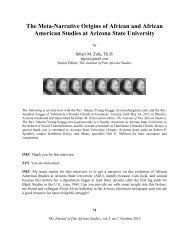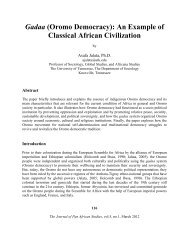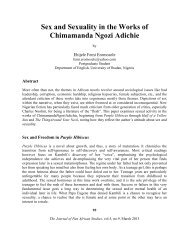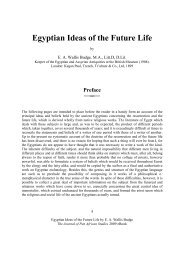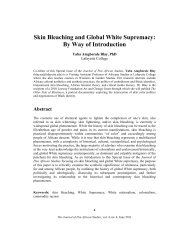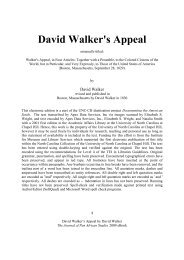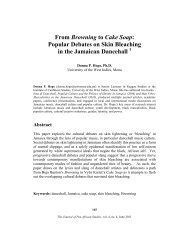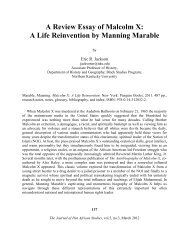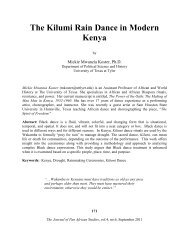Jacob H. Carruthers and the African - Journal of Pan African Studies
Jacob H. Carruthers and the African - Journal of Pan African Studies
Jacob H. Carruthers and the African - Journal of Pan African Studies
Create successful ePaper yourself
Turn your PDF publications into a flip-book with our unique Google optimized e-Paper software.
Introduction<br />
What is <strong>the</strong> Sociology <strong>of</strong> Knowledge?<br />
The sociology <strong>of</strong> knowledge is <strong>the</strong> study <strong>of</strong> <strong>the</strong> social construction <strong>of</strong> knowledge<br />
(Berger <strong>and</strong> Luckman 1967). It seeks to explicate <strong>the</strong> social-contextual, political-economic, <strong>and</strong><br />
cultural moorings inherent in all facets <strong>of</strong> human knowledge (<strong>Carru<strong>the</strong>rs</strong> 1995; Parsons <strong>and</strong> Shils<br />
1990; Shujaa 2003; Thompson 1997). Thus, whe<strong>the</strong>r we are interrogating <strong>the</strong> conceptual<br />
imperatives <strong>of</strong> <strong>the</strong> state or capital, <strong>the</strong> m<strong>and</strong>ates <strong>of</strong> school curriculum, or even <strong>the</strong> policy<br />
directives <strong>of</strong> white supremacy <strong>and</strong> <strong>the</strong> worldview orientations that it seeks to impose, we are still<br />
speaking <strong>of</strong> knowledge, its social construction, <strong>and</strong> <strong>the</strong> broader social milieu in which it occurs.<br />
Thus, before delving into <strong>the</strong> main ideas <strong>of</strong> this particular study, it is necessary to explore two<br />
dichotomous trends within <strong>the</strong> construction <strong>of</strong> knowledge - that is, knowledge as an instrument<br />
<strong>of</strong> hegemony <strong>and</strong> knowledge as an instrument <strong>of</strong> liberation.<br />
Knowledge <strong>and</strong> Hegemony<br />
When considered from <strong>the</strong> state's perspective education must inevitably entail notions <strong>of</strong><br />
legitimate knowledge. However, what is hidden within <strong>the</strong> language <strong>of</strong> legitimacy is <strong>the</strong><br />
political-economy <strong>of</strong> hegemony. The notion <strong>of</strong> "legitimate knowledge" is merely a ruse. It is a<br />
means <strong>of</strong> controlling <strong>the</strong> conversation about <strong>the</strong> process <strong>of</strong> formal socialization-which is<br />
schooling. Schooling in <strong>the</strong> United States is a process that does not typically privilege critical<br />
thought <strong>and</strong> action, but instead encourages conformity to hegemony, rewards apathy to <strong>the</strong> status<br />
quo, <strong>and</strong> punishes agency with regards to radical social change. Mwalimu Shujaa states:<br />
The society's achievement rewards <strong>and</strong> <strong>the</strong> means <strong>of</strong> accessing <strong>the</strong>m are controlled. Not<br />
only does a student have to demonstrate <strong>the</strong> capacity to meet academic achievement<br />
benchmarks, such as st<strong>and</strong>ardized test performance at prescribed levels, a student must<br />
also play <strong>the</strong> game according to <strong>the</strong> rules that <strong>the</strong> politically dominant culture's elite<br />
establish <strong>and</strong> control. Students who rebel rarely make it-<strong>the</strong> society's institutional<br />
structures are designed to promote conformity to those rules. (Shujaa 2003, 181)<br />
Hence schools do not typically exist as embodiments <strong>of</strong> <strong>the</strong> masses’ will, but ra<strong>the</strong>r as a<br />
reflection <strong>of</strong> state power <strong>and</strong> <strong>the</strong> related m<strong>and</strong>ates <strong>of</strong> capital <strong>and</strong> white supremacy (Hilliard 1995;<br />
Hilliard 1998; Shujaa <strong>and</strong> Afrik 1996; Stovall 2006; Watkins 2001).<br />
When I refer to hegemony I am referring to terror. But not <strong>the</strong> terror (or terrorism)<br />
symbolized by <strong>the</strong> color-coded warnings issued by <strong>the</strong> Department <strong>of</strong> Homel<strong>and</strong> Security. Not<br />
<strong>the</strong> terror <strong>of</strong> religious fanaticism. Nor am I referring to <strong>the</strong> terrorism <strong>of</strong> <strong>the</strong> state as expressed by<br />
25<br />
The <strong>Journal</strong> <strong>of</strong> <strong>Pan</strong> <strong>African</strong> <strong>Studies</strong>, vol.5, no.4, June 2012



